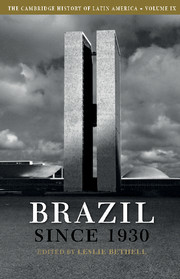Book contents
- Frontmatter
- PART ONE POLITICS
- 1 Politics in Brazil Under Vargas, 1930–1945
- 2 Politics in Brazil under the Liberal Republic, 1945–1964
- 3 Politics in Brazil Under Military Rule, 1964–1985
- 4 Politics in Brazil, 1985–2002
- PART TWO ECONOMY AND SOCIETY
- Bibliographical Essays
- Index
- THE CAMBRIDGE HISTORY OF LATIN AMERICA
- References
3 - Politics in Brazil Under Military Rule, 1964–1985
from PART ONE - POLITICS
Published online by Cambridge University Press: 28 May 2009
- Frontmatter
- PART ONE POLITICS
- 1 Politics in Brazil Under Vargas, 1930–1945
- 2 Politics in Brazil under the Liberal Republic, 1945–1964
- 3 Politics in Brazil Under Military Rule, 1964–1985
- 4 Politics in Brazil, 1985–2002
- PART TWO ECONOMY AND SOCIETY
- Bibliographical Essays
- Index
- THE CAMBRIDGE HISTORY OF LATIN AMERICA
- References
Summary
INTRODUCTION
The golpe militar (military coup) of 31 March–1 April 1964 which overthrew the legally constituted government of President João Goulart made use of a good deal of democratic rhetoric: one of the principal aims of what the instigators of the coup called the ‘Revolution’ of 1964, besides ending the ‘chaos, corruption and communism’ of the Goulart administration and restoring discipline and respect for hierarchy in the Armed Forces, was the elimination of the threat, as they saw it, that the Goulart administration posed to Brazilian democracy. The coup was, in this sense, a countercoup for democracy. In the aftermath of the coup, however, by means of a series of so-called Atos Institucionais (Institutional Acts), complementary acts, a new Constitution, a revised Constitution, constitutional amendments and various so-called pacotes (packages of arbitrary measures), the military regime established in April 1964, while never entirely destroying them, radically remodelled and severely undermined the democratic institutions, albeit limited and flawed, established in Brazil at the end of the Second World War.
For twenty-one years, until the transition to civilian rule (though not yet to a fully fledged democracy) in March 1985, Brazilians lived under authoritarian military rule. During this period a succession of five presidents, all of them senior (four-star) generals, were first selected by the military high command (after 1967 formally constituted as the Alto Comando das Forças Armadas) and then indirectly ‘elected’, at first by Congress, later by an Electoral College, a majority of whosemembers were guaranteed to support the military’s chosen candidate.
- Type
- Chapter
- Information
- The Cambridge History of Latin America , pp. 165 - 230Publisher: Cambridge University PressPrint publication year: 2008
References
- 4
- Cited by

